It’s easy enough to feel like the Predator during an opening shootout, when we as the audience have no real idea who the hell anyone is or what’s going on. Except we know at once that we’re trapped in an action film, and a fairly gratuitous one at that. No problemo there. Gratuity and I are old friends. But Predator 2 is unique in that it lets us know, almost from the first, that it knows we know how gratuitous all this is.
I think this extra level of aesthetic intelligence contributed to Predator 2‘s near-universal condemnation. Genre fans failed to appreciate the time, effort and thought that went into this production (at least at the time…most have woken up since, and the rest of you should keep reading – this one’s for you guys), while non-fans…well…we all know there’s no reasoning with them, don’t we? Yes.
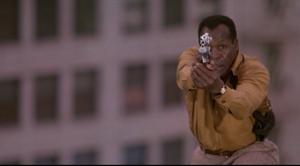
Rumor has it our returning screenwriters, John and Jim Thomas, wrote this sucker as another Ah-nuld vehicle under the mistaking impression that his presence added anything essential to the first film. And hell, maybe it did – I’ve read reviews that panned this film for its lack of Ah-nuld alone…but I digress. Fact is, Ah-nuld rejected the very idea of a Predator 2, especially hating the idea of setting it in a city. As if the Mexican jungle (standing in for Nicaragua) added anything essential to the first film…logic Robert Rodriquez seems to have followed for his Predators.
But I digress again. Ah-nuld went on to make Running Man, Red Heat and Twins instead, leaving an Action Hero-shaped hole in this production, which gave 20th Century Fox shivers. It would take two years and one successful comic book miniseries (since novelized as the excellent Concrete Jungle) to wring a greenlight for Predator 2 out of the suits.
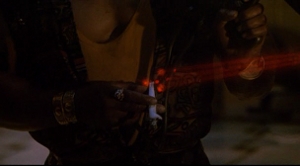
With no preamble, the film drops us into what the Helpful Title Card calls “Los Angeles, 1997.” (Ha!) Future LA (as viewed from the high, distant past of 1990) is a shitstorm of heat, dust, and gang wars. Why, here’s one right now: a street-level shootout between Colombian narcotrafficantes and your good friends and mine at the LAPD.
This serves the same function as Ah-nuld’s team’s destruction of the (Sandinistan? More than likely) camp fifteen minutes into their adventure: it effectively introduces us to this world and its characters by hitting us in the face with bloodshed and explosions. But fuck Ah-nuld’s initial misgivings: I say, setting things in an urban dystopia allows for greater economy of exposition. No need for some boring speech by some stereotypical General. Here, we know where we are the same way we know Jesus loves us: the media tells us so.
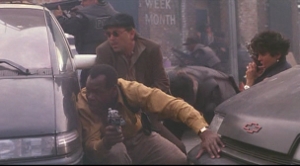
More on that later. For now, let’s meet Lt. Michael R. Harrigan (Danny Glover, between Lethal Weapons 2 and 3), whom a text-reader program will later describe as having a “violence-prone, obsessive-compulsive personality, with a history of excessive force throughout his eighteen years as a Los Angeles police officer.” That is, he’s a Warrior Cop who Doesn’t Play by the Rules. Typical L.A. bacon. Typical Hollywood bacon as well. Five minutes after arriving on-site, Harrigan single-handedly concludes the shootout, ensuring the rescue of two wounded officers and the deaths of four random, Spanish-speaking (i.e., evil) gang members. And I’m wondering, What? Has the LAPD of this universe never heard of rooftop SWAT snipers?
Apparently not, for the rest of the gang escaped into their arms cache/five-story walk-up during Mike’s heroic rescue/brutal bad-guy massacre. Orders from “Chief Heinemann” (Robert Davi) prescribe against Mike’s following them inside. But screw that, right? What Washington? What orders? Mike leads his team in…and discovers someone (or something) has already done their work for them, cleaning up one mess by making an even bigger (and bloodier) one.
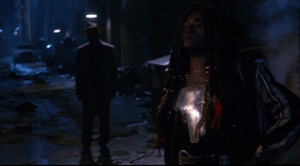
“What the hell is this?” Harrigan asks his fellow cops as they explore (along with the camera) a room full of dismembered drug dealers. Mike’s partner Danny (Rubin Blades) will later surmise that, “Whoever did this waited until the last minute, and then took out five men armed with machine guns by hand…and then got by us. Maybe we should give ‘im a job, put ‘im on the payroll.”
Unfortunately, the LAPD has enough “official” trouble already. It seems Chief Heinemann is himself getting trod upon by Special Agent Peter Keyes, DEA (Gary Busey, between Acts of Piracy and My Heroes Have Always Been Cowboys). Mike’s to “extend” his “full cooperation” to Agent Keyes’ little look into the local drug scene. This amounts to asking “how high?” whenever Keyes says “Jump”.
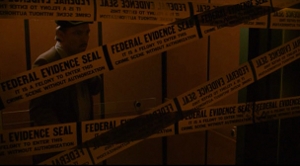
Since no Warrior Cop worth his inability to Play By The Rules would dare knuckle under for Gary Point Break Busey, Mike and his (seemingly handpicked) team of cops who Don’t Play By The Rules rush right into the scene of our next grisly murder…and right into Keyes. “The next time you cross me,” Mr. “DEA” warns Mike in trademark Busey Hiss, “you’re gonna come up missing.” Keyes is such a bad ass he’s got Adam Baldwin for a Smithers. The character’s name is Garber, but it could just as well be Marcus Hamilton, especially once Garber volunteers to “take care” of Mike. (Keyes declines.) Or when he delivers this film’s one Immortal Line, telling Mike that Keyes is, “The last person in the world you wanna fuck with.” Baldwin’s youthful-but-dangerous-seeming presence, and Busey’s haughty, I’m-Gary-Busey-Damnit demeanor, add an air of extra-judicial menace to Keyes’ entire operation. As Harrigan says, “These guys sure aren’t the DEA.” What are they really after?
Well, we the audience know Keyes is tracking the extraterrestrial trophy hunter who’s been stalking Mike (and his merry band) since the mercifully credits-free opening. In true Alien-rip-off fashion, the Predator makes mince meat of Danny, forcing Mike to become a Cop on a Mission. He even gets to say, “Now it’s personal,” in the emotive sneer of a cop who’s lost his long-time partner to an invisible alien.
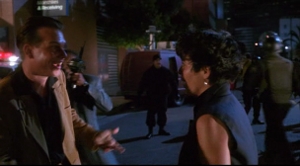
That’s one of the things I like about these Fox monster movies: back in the 80s, they never hesitated to brutally murder their main character’s friends. These are the stories of people whose lives are irrevocably changed by their encounter with the Unknown. As opposed to today, when hero’s families are off-limits and the reward for surviving your alien adventures is Megan Fox.
Back in the day, people like Rubin Blades and Bill Paxton could still play cops in movies, and no one “gets” this film’s Token Girl: she’s Maria Conchita Alonso, damnit. Blades is meant to be the Danny Glover to Danny Glover’s Mel Gibson, leaving Maria to play someone’s Lorna Cole…the Thomas brothers only know who. And I wish the script had left more room for the three of them to be the Buddy Cop team they’re obviously meant to be. But the Thomas’ are no great shakes at characterization. As before, they assign every character an occasionally-annoying trait (or, in the case of Alonso’s character, a gender) and leave the action sequences to do the rest.
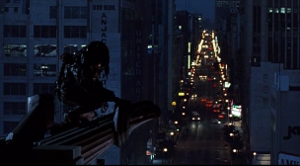
On the one hand, this is what’s known as “lazy storytelling.” On the other, it allows the actors a free reign often denied them in more story-centric films, which inevitably revolve around someone Learning Something about themselves and Growing as a Person. Belch. The makers of Predator 2 exploit the old dictum, “Show don’t tell,” to the hilt, allowing little bits of business go a long way. As when Harrigan lays his badge on Danny’s grave…just as Mac zipped his own flask up in Blane’s body bag (backed up by the same music). As when Danny reveals himself to be just as much a rule breaking cop as his friend (to his downfall). As when Leona instantly earns my trust by putting a serious hurt on Bill Paxton’s character, Jerry.
Even Jerry has moments – as when he attacks the film’s other Odious Comic Relief character, the seedy pseudo-journalist Tony Pope (easily the film’s most prescient character, played eerily well by pseudo-talk show host Morton Downey Jr.), earning just enough clout to make me care about his meaningless death. Even that’s noble enough to make Jerry endearing – more than a cocky, Hudson-analog. It certainly makes him a worthy trophy for our Predator.
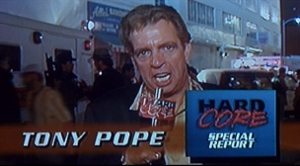
And it’s the Predator(s) who really shine(s) throughout. Benefits of a longer schedule, and the sheer talent of creature effects creator Stan Winston and production designer Lawrence G. Paull. Through intricate artistic work, the two catapulted a simple Alien rip-off into the cultural cannon. Back in the jungle, we were left with vague notions about Galactic Great White Hunters, but these were the half-educated guesses of grunts under high stress. Here, the Predator clearly represents an advanced alien species with enough cool shit on their walls to hint at a long and illustrious history. Comic books, video games, and under-appreciated sci-fi authors have spent the last twenty years running with what Predator 2 threw down. For that, it deserves respect.
It’s not as if Trophy Hunters from Space is some kind of original concept…yet Winston and Paull managed to give the Predators their own aesthetic sense, at once Spartan and busy as all hell… all the more alien for being so recognizable. Seen one shoulder-mounted, laser-guided plasmacaster and, brother, you’ve probably seen ’em all. Or you’re dead. But all the computing power at George Lucus’ command can’t match the wonder of the Predator’s trophy room.
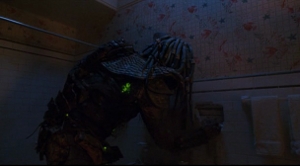
Beyond all my wonkish enjoyment of special effects techniques, there’s a refreshing existentialism in these Fox monster productions, summed up by the first (and, really, only) English phrase this Predator learns: “Shit happens.” That sums up both Alien and Predator better than a thousand nattering naboobs of negativity (like me). No wonder Winston thought the two belonged together. Both stories take place in dimensions where horrible things happen to good people for no reason…just like this one. It’s rarer than you think, especially in trash sci-fi pictures.
This time, shit happens in a definitely-real location, at a time already and definitely-past (now a past-future, if you can dig that). This undoubtedly puts off people suited to meeting their monsters in the far future or the darkest jungles. But by choosing a bullet-ridden, heat-hazed LA filled with conflicting forces and selfish agendas, Predator 2 creates the illusion that its universe has a life outside the confines of this silly story.
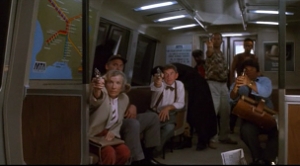 And it is pretty silly in spots. Unintentionally, even, on occasion (as with certain aspects of Paxton’s performance). Gratuitously violent in others. Vulgar, loud, ugly…everything you could ask for and more. Stephen Hopkins would go on to shock us all by directing 1996’s ill-fated Lost In Space remake, but rest assured: he’s much better at injecting meaning into onscreen violence. And, more importantly, he’s not shy about the results of violence, something rarely portrayed with this much sticky detail in big budget action movies.
And it is pretty silly in spots. Unintentionally, even, on occasion (as with certain aspects of Paxton’s performance). Gratuitously violent in others. Vulgar, loud, ugly…everything you could ask for and more. Stephen Hopkins would go on to shock us all by directing 1996’s ill-fated Lost In Space remake, but rest assured: he’s much better at injecting meaning into onscreen violence. And, more importantly, he’s not shy about the results of violence, something rarely portrayed with this much sticky detail in big budget action movies.
That detail ensured Predator 2 would be as one of the first films to net an NC-17 from those staunch moralists at the MPAA. Massive cutting resulting in the current R. I gotta wonder what the film looked like before Jack Valenti’s morality mob gave their notes. What’s missing…more sex? I’d expect more violence after the orgy of macho that was the last film. But whereas John McTiernan seemed to bring a light touch to his action extravaganza, Hopkins occasionally allows his film to plant its tongue in its cheek, and fuck anybody who doesn’t like it. As when the Predator’s ambushed by a ten-year-old boy with a squirt gun shaped like an uzi. As when an entire subway car’s worth of Bernhard Goetz clones meet the ultimate mugger. As when the Climactic Battle forces the Predator to perform some personal First Aid…in an old lady’s bathroom. With tropical fish on the walls. How could I not love a sci-fi/cop drama film with scenes this surreal?
 Glover’s the better action movie protagonist anyway. He’s always been able to act rings around Ah-nuld and his character’s certainly smarter than Maj. “Stick Around.” Mike even defuses a fusion bomb by slicing it in half, and who the hell knew that would work? Who knew Glover could become the Martin Riggs he’s so obviously meant to be? I’d chose him over Mel Gibson or Ah-nuld any day. His presence manages to convey a degree of humanity absent the performances of his contemporaries. I never once got the notion that Mike Harrigan suffers from the Nixonian, Dirty Harry sociopathology that infects most action movie protagonists. Little character moments – like Mike’s speech to Jerry early in the film, or Mike’s fear of heights – which remains constant throughout, is not miraculously overcome by film’s end, and (in a nod modern movies would never get away with) is never even directly mentioned – make all the difference. They’re the nuances of professional performance.
Glover’s the better action movie protagonist anyway. He’s always been able to act rings around Ah-nuld and his character’s certainly smarter than Maj. “Stick Around.” Mike even defuses a fusion bomb by slicing it in half, and who the hell knew that would work? Who knew Glover could become the Martin Riggs he’s so obviously meant to be? I’d chose him over Mel Gibson or Ah-nuld any day. His presence manages to convey a degree of humanity absent the performances of his contemporaries. I never once got the notion that Mike Harrigan suffers from the Nixonian, Dirty Harry sociopathology that infects most action movie protagonists. Little character moments – like Mike’s speech to Jerry early in the film, or Mike’s fear of heights – which remains constant throughout, is not miraculously overcome by film’s end, and (in a nod modern movies would never get away with) is never even directly mentioned – make all the difference. They’re the nuances of professional performance.
The same goes double for Kevin Peter Hall’s second and last turn as the Predator, which brings a professional mime’s sense of grace of poise to the sci-fi monster antagonist. This adds an extra dimension of other-worldliness to our extraterrestrial, allowing attenuated viewers to read more into Hall’s titled head or bunched-up shoulders than an ocean of prose could possibly convey.
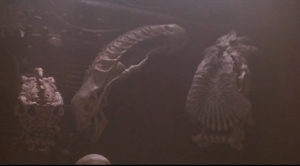 Being sci-fi monsters, the Predators avoid most of the usual Noble Savage tropes that piss me off so much. They don’t possess special powers that make them one with nature, or give them any essential insight into the human condition. They don’t give a toss about humanity in any real sense. To them, we’re wild animals who give good sport and occasionally perform an amusing trick. Like killing one of them in (what’s more or less) a fair fight. But would we recognize their definition of a “fair fight”? Assuming they lowered themselves to explained it to us?
Being sci-fi monsters, the Predators avoid most of the usual Noble Savage tropes that piss me off so much. They don’t possess special powers that make them one with nature, or give them any essential insight into the human condition. They don’t give a toss about humanity in any real sense. To them, we’re wild animals who give good sport and occasionally perform an amusing trick. Like killing one of them in (what’s more or less) a fair fight. But would we recognize their definition of a “fair fight”? Assuming they lowered themselves to explained it to us?
Questions like this keep me coming back to these loud, slap-happy, gratuitous films. That they can inspire such questions is a sign of their true value, their lasting appeal, and my eternal gratitude. Filmmakers of past present and future, take heed: Thin-de le’hasuan ‘aloun’myin-del bpi-de gka-de hasou-de paya. And yes, now that you mentioned it, I would love some candy.
![]()
![]()
![]()
![]()
![]()

Holy moley, a positive review of Predator 2? Well, I must ask you–want some candy?
I’ve always liked this film more than my betters thought I should. It moves at a terrific pace, has great atmosphere, better music than the first, and…just a secret between you and I…it’s the Ultimate Treadmill Move.
Have you ever exercised on a treadmill? It’s the most boring exercise in the entire realm of exercise. You’re plodding, plodding, plodding, waiting until some mile-marker is reached…unless you’re watching the right movie. Predator 2 has the perfect match of high action and rest areas. The pacing is so well done that you truly feel exercised and not simply punished.
I worked at a hotel (before the current economic vacuole) and once, Danny Glover stayed with us. I really wanted to tell him how much he meant to my exercise routine. But I suspect, then as now, that Predator 2 is not one of the highlighted entries on his resume. Of course, who knows? (I think the only other film of his I’d seen at the time was “Antz.” Yeah, that’s something to bring to the table–though I think that film is very underrated.)
“I thought he was here to fix the air conditioner!”
Considering how far Glover’s fallen from his Action Star perch in the late-80s/early-90s, I’d be reevaluating my career highlights, were our positions reversed. I’m not sure which is lower in the universe of all roles for aging, Action stars: playing yet another Cop Who Doesn’t Play by the Rules with a Martin Riggs chip on his shoulder (in Saw), or playing the President of the United States in a Roland Emmerich movie (2012). The latter is certainly a better choice of material, but accepting the role never seems to do anyone any favors. Exhibit A: Bill “President Whitmore” Pullman.
Very well done! You certainly have given context to what has become fanboy cotton candy. It amazes me that this film gets so little respect, and yet adds so much to the “predaverse.” My personal favorite scene is predator ER with a broken mirror and a fusion camp stove. Oh yeah, he’s that bad ass.
If “Predators” makes enough money they should do “Predators 2” set in mexico city. Just let that roll around your imagination!!
Lazarus Lupin
http://www.traileraddict.com/trailer/devil/trailer
Art and Review
Obviously, you’re not alone in your amazement at this film’s bad rep…something you’d think the Aliens vs. Predator films would’ve improved, but that would be using logic.
And that’s certainly one of my top five scenes as well (even after going over the damn thing frame-by-frame, twice). As we watch the predator patch himself up and Danny Glover navigate the side of his “thirty-story log,” Glover mutters, “Yeah, maybe I’ll get lucky and fall.” I can easily imagine the predator grumbling something similar to himself as he slathers flame-broiled wall all over his arm-stump: “Yeah, maybe I’ll get lucky and die of shock…save myself the embarrassment of explaining all this to the guys. ‘Hey, man, you hear about [insert name here]? Fuckin’ ooman Cowboy Cop chopped his arm off with his own smart disc. And get this: was it Ah-nuld, Van Damme, or Stalone? No…it was Danny “I’m gettin’ too old for this shit” Glover, if you can believe that.'”
As for old Mexico…that might actually have some potential, assuming the film preserved the parallelism and stirrings of self-awareness that makes the first two films worth owning in the first place…something I’m not even sure Hollywood is capable of anymore, but who knows? By the time anyone reads this I’ll have actually seen Predators, making me capable of discussing it in anything other than Enraged Fanboy Who’s Been Burned By Hollywood One-Too-Many Times terms.
I didn’t like the original PREDATOR at all, but PREDATOR II reversed the usual pattern and was a remake far surperior to its predecessor. The Predator wasn’t a mindless killer; he had standards. He spared the two women ( the drug gangs’ girl and Alonso) either because he didn’t consider it sporting to kill females, or because one was unarmed and the other was pregnant. I also liked the sly sense of humour the writer had: the character named Keyes ( like the guy in ET), “lions and tigers and bears” ( WIZARD OF OZ), the Predator having an ALIEN skull on his trophy wall …
In spite of everything I said in praise of the original Predator (and will say whenever I finishing writing up a review of Predators), you’ve hit it, absolutely. And summed up my entire review in two frikin’ sentences, as well you might. 🙂 Thanks.